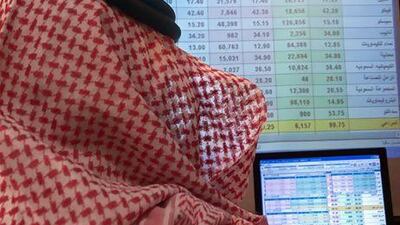Regional markets could ease their foreign ownership restrictions and compete for liquidity when Saudi Arabia's equity market opens up to foreign investors, stockbrokers from the Emirates say.
Their comments came after Mohammad Al Sheikh, the newly appointed head of Saudi Arabia's capital markets regulator, yesterday said government entities were working on a regulatory framework to allow direct foreign ownership of stocks.
"It will add liquidity to the Saudi market," said Fathi Ben Grira, the chief executive of Mena Corp, an Abu Dhabi investment company. "When the GCC see this effect they will be tempted to open their market, so there will be a domino effect."
Mohammed Ali Yasin, the managing director at National Bank of Abu Dhabi's brokerage arm, added that should Saudi Arabia make such a move many people would be afraid that money would leave Qatar and the UAE. But that is not likely to happen, he said, pointing out that "local Saudi investors may take this event as an opportunity to take the markets to a higher level, generating volumes, in a bid to sell to investors at higher prices".
Saudi Arabia's stock market, the region's most liquid with more than US$1.3 billion traded daily, has been considering opening up to foreign investors for several years. Currently, foreigners have limited opportunities to invest through equity swaps and exchange-traded funds. About 90 per cent of current market activity is dominated by retail investors.
"While foreign investments are welcome, they're not crucial to liquidity," Mr Al Sheikh, the chairman of the Capital Market Authority (CMA), said on the sidelines of the Euromoney conference in Riyadh yesterday. "There are a number of government entities, including CMA, that are looking at that [direct foreign investment]. We're finalising a regulatory framework with certain parameters."
Markets in the UAE and Qatar have long permitted share ownership by foreigners, but restriction limits remain on popular stocks, while select companies' shares such as Etisalat can be traded only by local investors.
The statements confirm speculation by institutional investors that the kingdom is looking at broadening its spectrum of investors.
John Burbank, the founder of the $3.7bn San Francisco-based hedge fund Passport Capital, was quoted as telling Bloomberg in February that foreign direct investment in Saudi Arabia's equity market could happen in the next year and may attract as much as $30bn of inflows.
Jamal Al Kishi, the chief executive of Deutsche Securities Saudi Arabia, said in the same month that he was "convinced" the market would open up to foreign investment and was "optimistic" it would be soon.
Saudi Arabia's bourse has a market capitalisation of more than $383bn, with more than 150 companies listed.
"It's not going to drain liquidity from the UAE, but there will be a competition for liquidity among regional markets," Mr Ben Grira said. "GCC investors can already invest in Saudi Arabia. Fund managers in London who will go to Saudi are not in the UAE for the moment. It's money in London that will be allocated in KSA."
* with agencies

